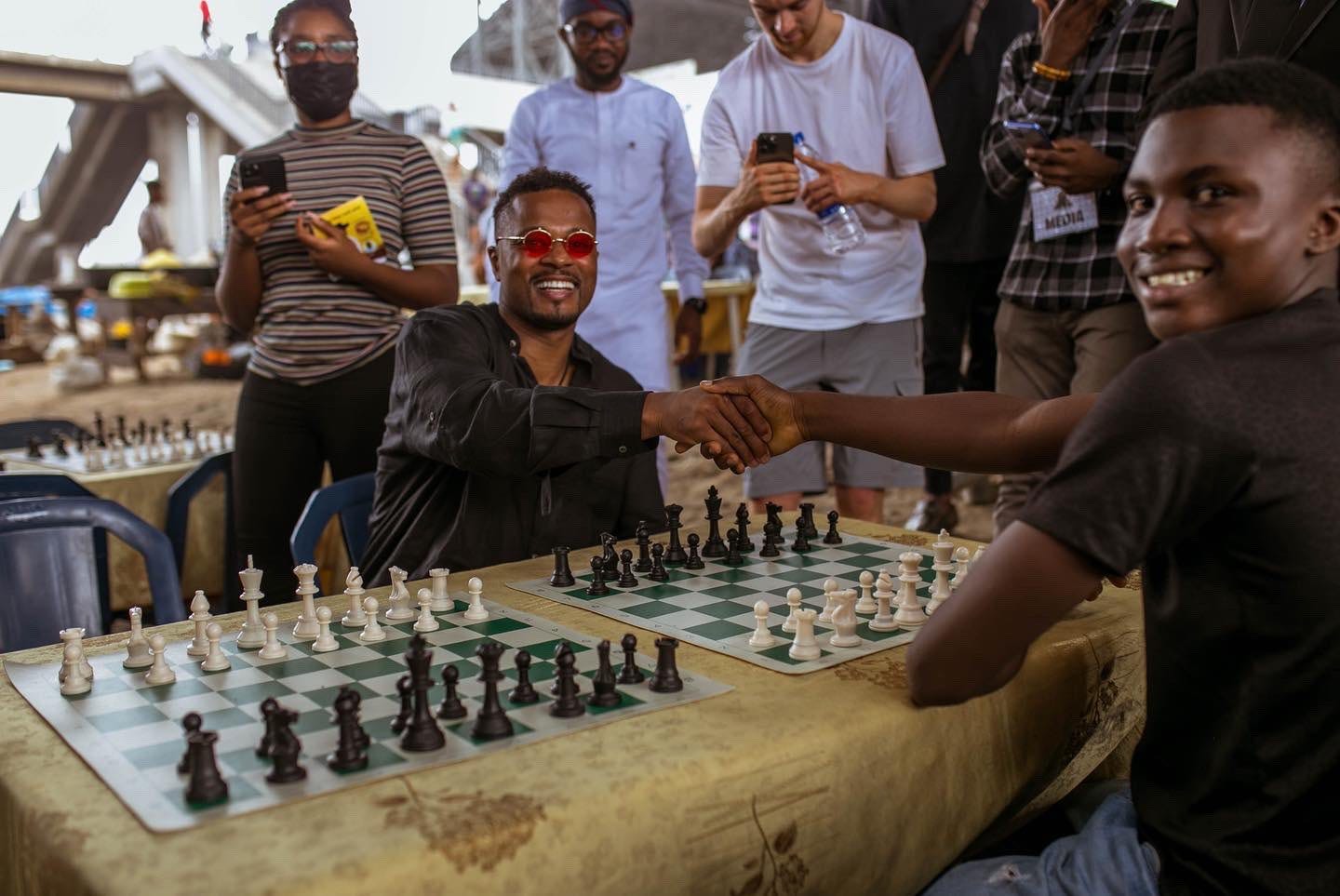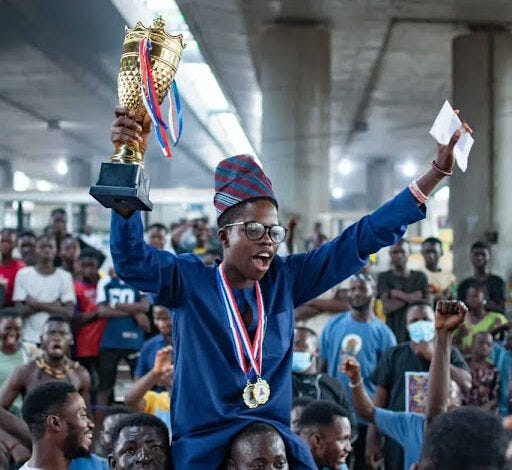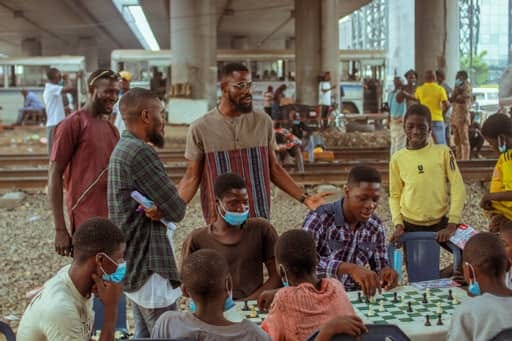
Adebola Makinde
Lagos, Nigeria: Fawaz Adeoye, 20, used to frequent Oshodi under bridge in Lagos state before time and chance happened to him. The bridge is famous for thuggery and drug use as well as hoodlums — some of whom are convicts — lurking around. Children who live under this bridge are mostly homeless and in order to sustain their living in such an environment, they engage in menial jobs, including being a bus conductor, running after vehicles to sell items, etc.
After his mother’s death, Adeoye learnt fashion designing until he left his grandmother’s place to live with his aunt in Lagos. He would also have to leave his aunt’s place, following their frequent disagreements, to find shelter in Idi Oro, a neighbourhood in Mushin where he slept in front of closed shops and stalls regardless of the weather conditions.
At Oshodi Bridge, Adeoye served as a bus conductor. Other times, he sold nose masks or engaged in street begging where he often made N10,000 daily compared to his N7,000 earnings as a bus conductor.
His earnings were usually spent on marijuana (known as Igbo in local parlance) which he took as a means of defence in the ecosystem that has been contaminated by people who reek of hard drugs and other controlled substances.
Many kids like Adeoye are still on the streets, begging and barely have access to formal education. According to a survey by the United Nations Children’s Fund (UNICEF), there are between 10.5 million to 18.5 million out-of-school children in Nigeria.
Chess as a revolutionary instrument
Sometime in 2021, Adeoye was discovered alongside other kids under the bridge by Chess in Slums Africa (CISA). He now plays chess under one of the organisation’s programmes. Apart from playing chess, Adeoye is exceptional in mental maths.
CISA was founded in 2018 by Tunde Onakoya and together developed by his team of impact makers and chess entrepreneurs who are on the mission of using chess to provide education for marginalised kids.
In an interview, Onakoya said he started playing the game after it was introduced to him at a men’s salon in Ikorodu. From there, he played the game at different places, representing his school at the time, church, as well as the country (Nigeria) to win prizes. He would later become a coach and a chess entrepreneur.
The organisation started in Majidun, Ikorodu and partnered with other organisations and enterprises such as Chessable, Chess.com, Chess Kid, Venture Garden Group, Lazerpay, ChipperCash and OctaFX etc. to carry out its projects that require heavy funding. According to Emmanuel Abiodun Oke, the organisation’s Chief Operations Officer, “It costs N200,000 (equivalent of $467.43) to sponsor the education of a child per year.”
In order to gain access to the communities, the organisation also partners — in an open invitation — with local chiefs and elders who would in turn ensure that children are available for the training by bargaining with parents while expounding the benefits of the game. In the case of Majidun and Makoko, consultations with local chiefs were duly observed. However, for the Oshodi under-Bridge project, the organisation ensured that the younger children were looked after by the older ones who lived under the bridge.
The training, which consists of hands-on-board chess sessions, mental maths and round off discussions to get to know the children intimately, usually goes on for two weeks after which some of them are placed in shelters or reconnected to their families. The organisation then pays scheduled visitations to these kids and make sure their needs, including proper formal education are met. In a few cases, their parents or guardians are empowered.
CISA has executed more than 15 projects, including tournaments, medical check-ups, skill acquisition and meetings with outstanding personalities like former Manchester united defender, Patrice Evra and popular Nigerian architect, Tosin Oshinowo in different slums of Lagos. It has also impacted 976 children across communities in Majidun, Makoko, Oshodi, Kaya (Burkina Faso) and Mauritius.

One of the projects of the organisation was the tournament held during Oshodi under-Bridge Chess Project where Adeoye won the overall prize of N20,000 ($47. 94).
After the tournament, Adeoye and some of the kids were enrolled with Kids That Code to learn programming language and other computer skills. This was enabled by the partnership between CISA and the latter.
14 media opportunities with deadlines in October
Adeleye Oluwakorede, team head for Child Guidance and Care at CISA, emphasised that the game involves critical thinking. In his words, “Unlike Ludo or Draft that requires swift counting, chess demands critical thinking before a move is taken. The game can even last a day. Imagine how that will stress your mental capacity if you have to play this game every day.”
Adeoye, an average English language speaker, was taught chess and programming mostly in Yoruba Language (his mother tongue) and executed solutions with the same. He reminisced about how difficult it was for him to solve challenges in the English language at first. These tasks would have been carried out in the former, but he effectively utilised his mother tongue, the language he understood.
Addressing the language barrier, Peter Abidogun, the team head for chess education, assured that a child, even if uneducated, would only require maximum attention dedicated towards the game.
“You don’t need to have any educational knowledge to learn the game as long as you have a brain. Once I’m able to communicate with a child in his own language — probably Pidgin, Yoruba or some other languages — then it’s as easy as teaching an educated child,” he said.
“Chess is a practical and mini game about life. There are so many qualities a child needs to learn to develop — that this game guarantees,” Abidogun added.

Now enrolled in school, Ayomide Ninalowo, 14, and his brother were introduced to the game in 2018 in Majidun, Ikorodu where the organisation started its operations. When Onakoya visited their home, he discovered their mother relied on crutches. Onakoya later decided to be the children’s guardian after her unexpected death.
Ninalowo, who had dropped out of school, got a scholarship from CISA and was re-enrolled. He recalls playing football in the area when someone he didn’t identify called his attention to a gathering of people giving children freebies. These people were from Chess in Slums Africa. They reserved freebies for children who participate in the game. Although he had joined because of the incentives, he opened up to liking the game since it now became a life changer for him.
He said the game had a positive effect on his mental wellbeing and has helped him in some particular subjects, including English and Mathematics, since the game principally deals with values.
At its facility, CISA teaches children mental mathematics in a quicker and natural way by using their fingers to solve sums relating to units and tens. The kids also use abacus, an early computing tool, during training at the facility under the tutelage of Gideon Sam-Itepu who joined the organisation in 2018.
The use of abacus to count numbers does not exceed elementary school. However, Sam-Itepu justified it as being an expeditious method in that children are able to solve complex questions in a short period.
“It takes a certain level of mastery to understand how to solve intricate numbers using the abacus tool. I’m able to teach a child an abacus technique that was coined from the fingers of their hands which is limited to unit and tens numbers so they are able to solve very complex arithmetics with speed. From there, they can transcend to using the abacus tool that solves numbers up to millions.”
When asked how these games connect to a child’s experience and perspectives, Sam-itepu explains that the games are fit to be used as an agent for life’s lessons and the way in which a chess piece is shaped challenges the curiosity of a child.
“As a child gets exposed to different personalities in the form of chess pieces, it becomes unveiling for the child to take part of a new world where their imagination takes precedence over their reality — to something more.”

‘Education should be accessible, not a privilege’
Yemi Fawole, a chess expert who holds the FIDE Master (FM) title from the world governing body of chess, International Chess Federation, said CISA’s approach is redefining the lives of hopeless kids who inhabit the slums — “the oddest places”.
In 2010, Fawole co-founded an organisation called BruvsChess with the aim of not just including chess in the school curriculum but to teach it as a subject. However, many public schools did not embrace the idea.
“Most public schools wouldn’t accept chess as part of their curriculum. We met with the ministry of education to discuss this extensively but it is yet to pass through the first reading at the Senate. It is the opposite for private schools. More private schools now hire instructors to teach chess,” he said.
Even though the bill hasn’t been ratified, the organisation has achieved a great feat, and Nigerian parents want the programme to be included in the curriculum. The organisation has taught more than 10, 000 students in different schools in Nigeria. Alongside Onakoya’s CISA, more kids are able to reveal their potential to the world. “They (Onakoya and Chess in Slums Africa group) are changing lives in unimaginable ways through the gift of chess. Education should be accessible to everyone and shouldn’t be a privilege,” Fawole held.
“One of the ways Chess in Slums is changing the narrative for kids from the slums is by enrolling them in schools – on scholarship and giving them a worthwhile experience that will last forever,” he added.
Rehabilitation and other challenges
Despite the lofty goals this drive has achieved, Sam-Itepu noted that rehabilitating the kids takes a toll while adding that the challenges do not sway them from their major assignment.
“There are some issues we face in the background that’ll be termed as challenges ranging from the language barrier and religious beliefs to child molestation,” he said. “But this is expected regarding the kind of people and places we go to. However, we have to be in control of that and focus on what really matters, and that is mentally rehabilitating these children and giving them a new narrative, which is the most important.”
Abidogun, the team head for chess education also told this report that “there are instances where parents misappropriate the funds they are given to start or support their already established businesses in order to further take care of their children.”
“For some reasons, they (parents) collect the money and use it for some other things and come back after a while to start begging and asking,” Abidogun pointed out.
The report was sponsored by I-79 Media Consults’ Campus Solutions project which is supported by the Solutions Journalism Network (SJN) as part of the 2022 LEDE Fellowship.
